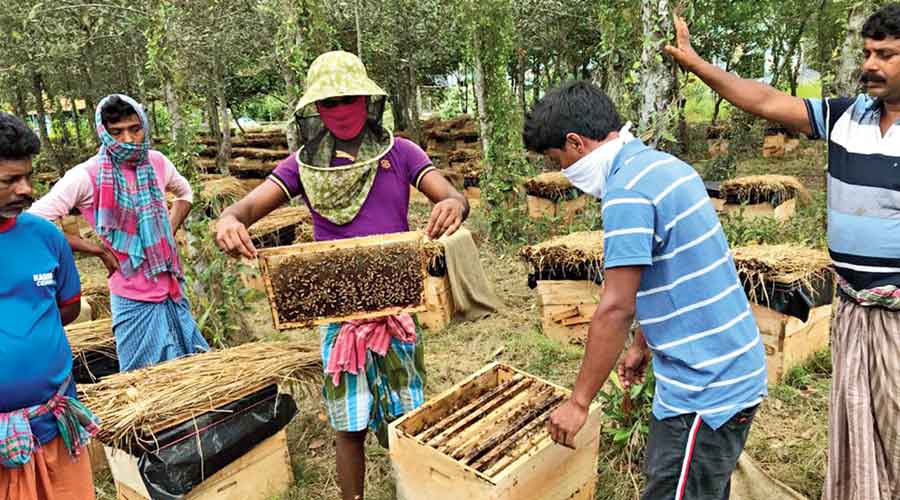Bottles of honey collected from the Sunderbans mangroves and packaged by villagers, who faced the double blow of the pandemic-induced lockdown and Cyclone Amphan, are finding more takers from across the country.
The sale of brand Bonphool, has jumped after a study, led by the New Delhi-based Centre for Science and Environment, found that honey sold by major brands in India was “adulterated with addition of sugar syrup”, said a forest official.
The honey-production programme, started by the state forest department, the panchayats and the rural development department in collaboration with WWF India as a means to generate alternative livelihood for villagers, who venture deep into tiger territory to collect honey or catch fishes and crabs, is barely a year old.
On Monday, stocks of Bonphool were sold out on a popular online shopping platform.
And the three cooperatives, set up jointly by the forest department, the panchayats and the rural development department and WWF India to produce honey from bee boxes, are working overtime to meet the demand that they had never seen before, the forest official said.
Honey collectors have been going inside the forest despite the risks of getting mauled by tigers since ages. In fact, there is a popular saying: “Modhu khoja mane bagh khoja” (finding honey equates finding a tiger). According to forest department figures, at least five to six of these honey collectors (official figures) are killed by tigers every year.
Bonphool sold 2,500 bottles per day on an average after the report was published last week, a forester said. As the demand soars, senior foresters are brainstorming to find out how to churn out more bottles and reduce time taken to pack each one before they are handed to the couriers for delivery across the country.
The honey has had thousands of takers and has the likes of writer Javed Akhtar among its admirers.
The demand for the honey started going up after a section of foresters started tweeting about the brand while focussing on the fact that they are collected from the mangroves of the Sunderbans.
The programme was started by Santosha G.R., who was serving as the divisional forest officer of the South 24-Parganas, and a senior official of the panchayat and rural development department of the state government.
The forest department had given 20 boxes each to 72 traditional honey collector families, who are called maulis in Bengali. It had also helped them to form three cooperative societies in the Jharkhali, Kultali, Nalgora areas and helped them secure soft loans from the state co-operative bank.
The villagers have been trained in bee-keeping by experts from the Krishi Vigyan Kendra in Nimpith.
Soumyajit Das, the special secretary of the panchayat and rural development department, said their sales counter on the ground floor of their office on Salt Lake was witnessing a steady stream of customers.
“The response is overwhelming,” said Das.
The department is setting up an app where orders can be placed.
The forest department too has started a dedicated webpage for taking orders and residents of Calcutta can get theirs home delivered for free.
To order one needs to visit: https://sundarbansjfmc.org/store/product-category/honey/
Tips for shoppers
Visit: Mrittika Bhavan, Plot no-18/9, Block-DD, Salt Lake, Sector-I
Online orders: https://sundarbansjfmc.org/store/ product-category/honey











